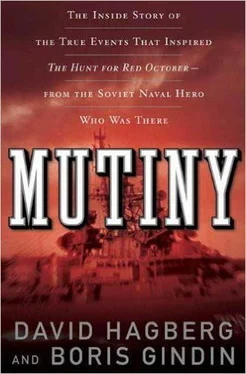Firsov looks over his shoulder to make sure that there’s no one to see him, and he wiggles through the hawsehole, the filthy seventy-centimeter mooring line getting his uniform dirty, and scrambles down to the bow deck of the sub.
Sablin is hanging over the rail at the bow of the Storozhevoy trying to peer through the fog at something going on in the water below, just to the starboard side of the submarine sitting low in the water, his decks just a meter or so above the surface of the water.
It is a few minutes before 2300, and by now the entire ship has been thoroughly searched from stem to stern and from top to bottom. The sailors and officers have checked every single compartment, crawl space, and locker where a man could possibly hide.
Senior Lieutenant Firsov is not aboard. Kovalchenkov and the others locked in Stepanov’s cabin below were right. Firsov has somehow gotten off the ship and is sending for help. Right now Sablin thinks he knows how it was done.
There is something going on below. He can make out a dim red light coming from the open hatch at the top of the sail. The Storozhevoy’s mooring line goes almost straight down. A man such as Firsov could have easily have crawled through the hawsehole, shimmied down the mooring line, and made it to the deck of the sub.
But would the submarine’s commander or anyone else aboard believe such a wild story about the zampolit arresting Potulniy and taking over the ship?
A brief flash of white light from below illuminates someone scrambling down into a small launch tied up to the side of the sub. It’s like a pulse of a strobe in Sablin’s eyes, an image of a slightly built man in a navy uniform getting into that little boat.
Moments later the small boat’s engine comes to life, and the launch heads away from the submarine.
Sablin rears back. He can hear the speech he means to broadcast as if the recording were playing right now through the ship’s 1MC.
“… we are demanding that our ship be recognized as a free and independent territory. We are demanding daily broadcasts on radio and television for thirty minutes. Our goal will be to oppose the current regime …”
Words and bits and pieces of his speech buzz inside his head like insects around a night-light.
“We are neither traitors to the Motherland nor are we adventurers who seek recognition for our deeds.”
He looks over the rail again, but the launch is long gone, lost in the fog on its way ashore.
To report the situation aboard the Storozhevoy!
To call for help!
To stop them!
“… the people find themselves trapped in a stagnant atmosphere of blind obedience to authority…
“…it’s political tyranny and censorship… Our people have already suffered much… we have laughed a million times, but our laughter is mixed with tears at the thought of the Motherland’s future.”
He turns and looks up at the superstructure, the windows of the bridge. No light is showing, but he has posted guards up there. All he needed was a few more hours before morning reveille, when the entire fleet was scheduled to drop their moorings and head to sea. The Storozhevoy would have slipped away with the others, entirely unnoticed.
He has to figure that once Firsov gets ashore he will alert the Riga naval duty officer and the harbormaster. If the Storozhevoy is caught here, still tied to the mooring, there will be no way out.
The only chance for them is to get the ten or fifteen kilometers downriver to the Gulf of Riga, then past Saaremma Island and out into the open Baltic, where at least they’ll have room to maneuver.
That’s exactly what has to be done! And done right now!
Now that Sablin has a plan to deal with this unexpected emergency it’s as if a liter of adrenaline has been dumped into his system. He crosses the foredeck as fast as his feet will carry him, slams open the hatch, and takes the stairs two at a time up to the bridge.
The armed guards he has posted hear him pounding up the stairs, and they raise their Kalashnikov rifles in alarm. With the way things have been going around here tonight, there’s no telling what might be coming their way. They’re plenty scared now that they’ve had a few hours to think about things. But they’re also fatalists, as many Russians, especially small-town country boys, are.
Russians have three principles, so the old proverb goes. Perhaps, somehow, and never mind. It’s hard to make a decision.
But it’s their zampolit, and they lower their weapons in relief.
“Has anyone tried to come up here?” Sablin demands.
“No, sir,” one of the sailors replies.
Sablin is furiously weighing his chances now. If they sail out of here and make it to the open sea, he’s all but certain the Soviet navy won’t fire on one of its own ships. If they can get that far before the river is blockaded, they’ll have a real chance of pulling this thing off. But if they stay, if he goes below and releases the officers he’s put under lock and key, the captain will arrest him and turn him over to the KGB. They might even arrest everyone who supported the mutiny and keep the Storozhevoy right here in the middle of the river for everyone in Riga to see until a replacement crew could be rounded up and brought down.
There’s no choice, not really. He’s started this business, and he will see it through. Once he gets his message to the Soviet people, the Kremlin won’t be able to touch them.
“Go below and round up the bridge crew,” Sablin orders the two sailors. “Get them up here on the double; we’re leaving tonight!”
The young crewmen might be confused, but they have their orders and finally they know what to do. They don’t have to think about anything else except doing what they’re told to do. They turn crisply and race down the stairs, as Sablin snatches the ship’s intercom phone off the overhead and calls the engine room.
It buzzes once, then again, then a third time. “Come on,” Sablin mutters impatiently. “Pick it up!”
Outside the bridge windows the fog is so thick that he can see only a few meters beyond the Storozhevoy’s sweeping bows and nothing much of the city except for the halos of some lights.
Someone answers the call. “Engine room, aye.”
“This is Captain Third Rank Sablin; do you recognize my voice?” Sablin demands.
“Yes, sir,” the young man answers after a brief hesitation.
“Start the engines! All four of them!”
No one responds.
“This is an order! Start all four engines now! I need full power as quickly as possible! Call me on the bridge when everything is ready!”
Sablin slams the phone back on its bracket and looks around the bridge at all the electronic equipment, switches and dials, the wheel, the engine telegraph, radar, controls for the weapons systems. He’s not an engineering officer, nor is he a bridge officer or navigating officer or communications officer or weapons officer. He is the zampolit. If the crew will not follow his orders, the Storozhevoy will stay here tonight.
“…I don’t think there is any argument that these days the servants of the state have already become the masters of the state …”
Sablin can hear the words of his speech as if he were broadcasting the recording at this very moment.
Someone comes up the stairs in a rush, and Sablin turns out of his daydream as three sailors appear in the doorway with the two guards. He recognizes them, but he can’t recall their names at that moment, though he knows that they are part of the normal bridge complement.
Читать дальше












